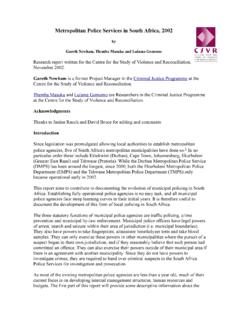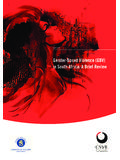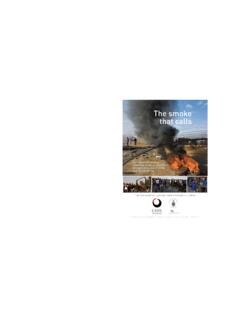Transcription of A Duty to Answer Questions? The Police, the …
1 A Duty to Answer Questions? The police , the Independent Complaints Directorateand the Right to Remain SilentbyDavid Bruce, Kate Savage & Johan de WaalOriginally published in the South African Journal on Human Rights, 2000. Vol. 16, Part 1. Thanks to Juta and Company Ltd. for permission to post the paper on this Bruce is a Senior Researcher in the Criminal Justice Programme at the Centre for the Study of Violence and Savage is a constitutional lawyer in private to Graeme Simpson of CSVR and Jonathan Klaaren for comments on earlier drafts of this of the obstacles which the Independent Complaints Directorate ("ICD") has experienced in the performance of its functions, has been the refusal of SAPS members whose actions are the subject of investigation, to Answer questions put to them by ICD investigators. This has been a particular obstacle in the investigation of deaths as a result of police action, and deaths in police custody, where there are frequently no non- police witnesses and potentially no witnesses other than the police officers whose actions are the subject of investigation.
2 In considering policy options, this paper focuses on police accountability in the context of police powers. Mechanisms to compel police co-operation in internal investigations, and with the ICD in its investigations are considered within the context of the current Constitutional framework. Amendments to the police Act which would set out the circumstances in which police officers might be obliged to Answer questions in both ICD and internal SAPS IntroductionThe Independent Complaints Directorate (ICD) is an independent body established in terms of section 50 of the South African police Service Act 68 of 1995 ('the police Act').1 Section 53(2) of the police Act empowers the ICD to investigate:(a) any misconduct or offence allegedly committed by a member;(b) any death in police custody or as a result of police action; and(c) any matter referred to it by the Minister or a provincial ICD may investigate matters "mero motu [on its own initiative] or upon receipt of a complaint".
3 An analysis of the constitutional and statutory provisions relating to the ICD suggests that the main function of the ICD is to ensure that investigations relating to possible offences and misconduct committed by members of the South African police Service (SAPS) are carried out effectively and Thus the ICD may carry out investigations itself or perform an oversight role, taking steps to ensure that police investigations of members are carried out properly, including supervising or monitoring such investigations. However while sections 53(2)(a) and (c) provide the ICD with a discretion in selecting which cases to investigate, in terms of section 53(2)(b) it is mandatory that the ICD itself investigate all police custody and police action ICD's role therefore primarily concerns the investigation, supervision and monitoring of cases where the actions or alleged actions of SAPS members are the subject of investigation. Questions have been raised as to whether the ICD has been provided with sufficient powers in order to carry out this role effectively.
4 One area which has received particular attention is the fac that the ICD only has the power to make recommendations to the SAPS, Attorney-General or Minister of Safety and Security but has no power to ensure, for instance, that action, such as the instituting of disciplinary charges, is actually taken against SAPS members, where it believes this is in terms of exercising its investigative powers the ICD has encountered certain obstacles in the performance of its functions. Sometimes these have related to the failure of SAPS members to co-operate with its investigations despite the fact that, in terms of section 53(6)(d) of the police Act, the Executive Director of the ICD is empowered to 'request and obtain the co-operation of any member as may be necessary to achieve the object of the directorate'. Particular difficulties have arisen when police officers who are the subject of investigation ('subject officers')4 have refused to Answer questions put to them by ICD investigators, often attempting to invoke a right to is notably in relation to the obligation to investigate police custody and action deaths that the refusal of members of the SAPS to Answer questions provides particular grounds for concern.
5 It is a feature of the circumstances in which these deaths occur that frequently the only witnesses, if any, are members of the police service themselves. Often these members will be the very members who have been involved in the fatal shooting of a person. Considering the serious nature and consequences of police actions of this kind it would appear reasonable to argue that police members should be fully accountable in relation to them. If members of the SAPS have access to a right to remain silent in such circumstances the implication is that members of the SAPS can kill people without being required to give any explanation for it. Furthermore, if the SAPS members involved in the fatal incident are the only witnesses to it and choose to remain silent the ICD may be unable to carry out a satisfactory investigation of the of the SAPS are public servants who exercise powers not available to ordinary members of the public, including powers to use force and arrest.
6 In general therefore it appears reasonable to require that the police be fully accountable for their actions, particularly if these are performed in the course of their duties. This would appear to imply that members of the SAPS should be regarded as having a duty to Answer questions during an ICD or internal disciplinary investigation or inquiry, particularly in instances in which death or serious injury arises. However any duty of accountability which is placed on SAPS members must also accord with the provisions of the the case of Magmoed v Janse van Rensburg5 Corbett JA stated that:Lwane's case made it clear that the rationale underlying the privilege against self-incrimination is the encouragement of persons to come forward to give evidence in courts of justice by protecting them as far as possible from injury or needless annoyance in consequence of doing so (see at 438G and also 444E). While this reason is pertinent in the case of the ordinary citizen, it is less appropriate in the case of a police officer who is obliged by virtue of his office to give evidence concerning matters arising from the execution of his police duties, particularly where the incriminating questions relate to the propriety and/or lawfulness of the manner in which he performed those duties.
7 Of course, if he refuses to Answer the questions, the court must perforce uphold his privilege to do so. But in the event of his answering such questions (not having been cautioned) there is less reason in his case than in other cases to exclude the evidence. Moreover, the propriety of police conduct is a matter of public concern, and public policy requires that such conduct should, as far as possible, be open to scrutiny in the courts. This factor, where applicable, also tends to countervail the rationale for excluding self-incriminating evidence. These considerations lead to the conclusion that, contrary to the view of the trial Judge, there were sound reasons for holding the evidence in question to be admissible; and that it serves the due administration of justice to do is therefore support in our own case law for applying different standards to members of the SAPS in relation to questions of the admissibility of statements made by them.
8 However the question which the report aims to address is not merely whether statements made by SAPS members should be admitted in court in the absence of their having been cautioned but whether SAPS members should be regarded as having a specific duty to Answer questions put to them by ICD investigators who are investigating incidents in which they were involved even where the answers to such questions may be of an self-incriminating nature. Effectively the paper aims to evaluate whether it is appropriate for SAPS members to have recourse to the right to remain silent when they are subject to investigation by the ICD. Potentially the questions at issue are also of relevance to whether SAPS members should be understood to have to a duty to Answer questions in relation to internal investigations and disciplinary hearings. The paper looks at potential mechanisms which may be put in place to compel SAPS members to Answer questions as well as examples of foreign jurisdictions where police members may be compelled to Answer questions.
9 In our conclusion we suggest a way forward on the issue. We also locate the questions raised within broader debates about mechanisms intended to assist in addressing the problem of police misconduct, police support for Human Rights, and the problem of the "culture of silence' within police The legal position(a) ICD investigations(i) Nature of ICD investigationsIn terms of section 53(6) of the police Act the Executive Director of the ICD may 'submit the results of an investigation to the attorney-general for his or her decision' ((53(6)(f)), 'make recommendations to the [SAPS] Commissioner concerned' (53(6)(i)) and "make any recommendation to the Minister or a member of the Executive Council which he or she deems necessary regarding any matter investigated by the directorate ..' (53(6)(j)).Section 40 of police Act provides that disciplinary proceedings may be instituted against members of the police service accused of Derived from the conclusion that that the ICD's role primarily relates to the investigation of alleged offences and misconduct by members of the SAPS is the inference that the power to make recommendations to the relevant SAPS Commissioner in part relates to the potential that the ICD may wish to recommend disciplinary action against specific SAPS members.)
10 ICD investigations may therefore lead to a case being submitted to the Attorney General in relation to possible criminal charges or to a recommendation for disciplinary into custody and action deaths may also generate evidence that is relevant to a subsequent Furthermore as has been argued 'the making of recommendations aimed at dealing with the causes of misconduct has far greater potential as a means of reforming police conduct than does the mere taking of action against individual offenders'.8 Even if it is accepted that the ICD's role primarily concerns the investigation of alleged police offences and misconduct it may therefore be the case that the ICD may make recommendations relating to for instance "training programmes and the implementation of policies aimed at curbing police misconduct".9 While deaths in police custody or as a result of police action, and complaints concerning the conduct of a member of the police service, are primarily investigated to determine whether there exists sufficient evidence of police misconduct, the outcome of ICD investigations is not limited to these types of findings.








